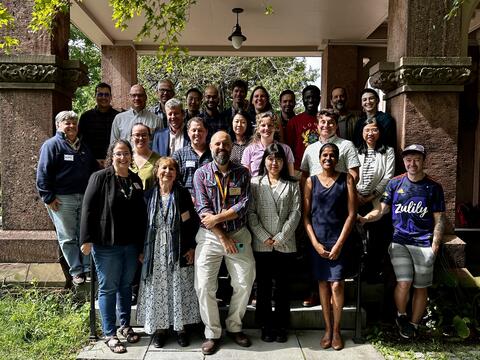
By: Wyatt Klipa ’23 MEM
The Forest School (TFS) at the Yale School of the Environment (YSE) prides itself on a commitment to interdisciplinary work and collaboration, noting that the greatest environmental and natural resources challenges of our time require integrated efforts to address. It still takes an intentional effort to break down the silos so common in academia and in conservation, a phenomenon which Eva Garen, director and principal investigator at the Environmental Leadership and Training Initiative (ELTI) at YSE, took note of this fall.
Garen had been aware for several years that the southern region of the Brazilian state of Bahia – the fourth largest state in the country by population and fifth largest by area – was a zone of interest for several researchers as well as Centers, Programs, and Initiatives (CPIs) at the School. Mark Ashton, Morris K. Jessup Professor of Silviculture at TFS, and Florencia Montagnini, senior research scientist at TFS, have worked in Brazil alongside Daniel Piotto ’06 MF, ’11 PhD, professor of agroforestry at the Federal University of Southern Bahia (UFSB), for nearly two decades.
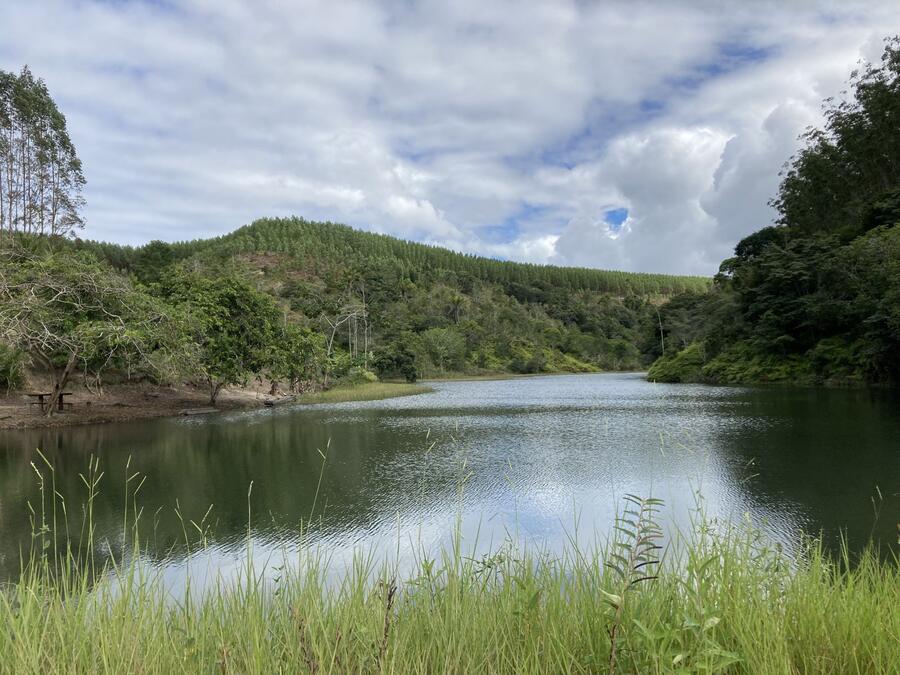
The landscape of Southern Bahia is dynamic with a dammed lake protected by natural forest in the foreground, eucalyptus plantation along the ridgeline in the background, and a smallholder subsistence tree garden on the left. Each of these multiple uses must be balanced. Photo: Thomas Harris, 2022.
Starting in 2007, ELTI— which supports tropical forest restoration and conservation through training and capacity building— began working in Brazil’s Amazon region by implementing field courses on tropical forest conservation and restoration with decision makers and Indigenous communities. On Ashton’s recommendation, ELTI initiated programming in southern Bahia in 2010 by implementing a series of field courses on ecological restoration and payments for ecosystem services with partners in the region, including the Centro de Pesquisas Ambientais do Nordeste (CEPAN), Flora Brasil, and Instituto Biostlântica. The ELTI team launched a new partnership with Instituto de Pesquisas Ecológicas (IPÊ) in 2018 and is currently developing a training landscape with IPÊ in southern Bahia.
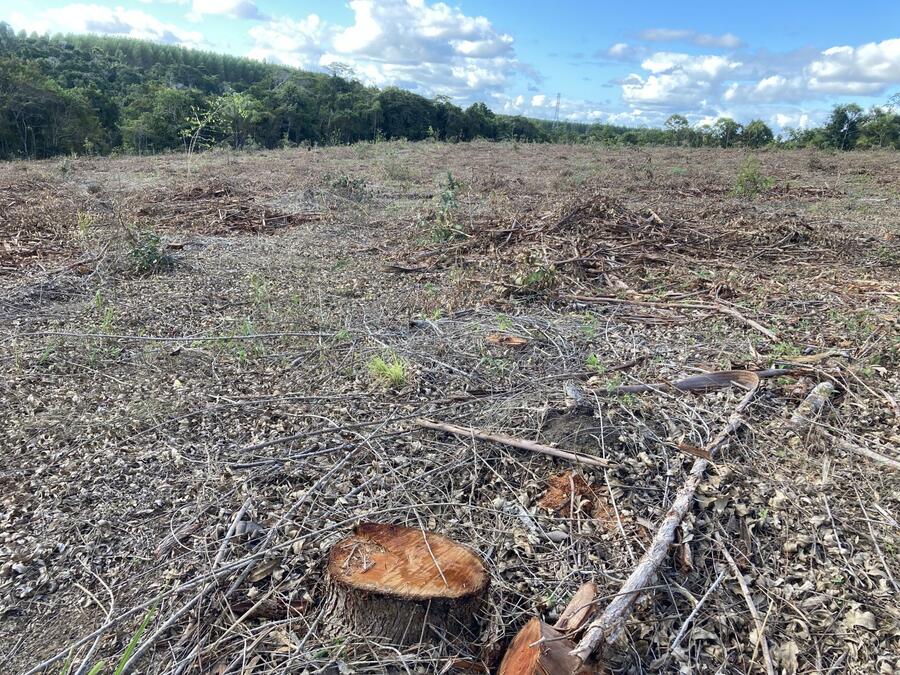
This eucalyptus plantation—grown for pulpwood and paper—is prepped for planting for the next generation of trees after the final stage of the harvest. Such plantations are common in the state, and ongoing TFS research centers around identifying the proper balance of native forest restoration and economic benefits of plantation wood products. Photo: Thomas Harris, 2022.
Meanwhile, The Forests Dialogue (TFD), a multi-stakeholder engagement CPI at TFS, has facilitated multiple dialogues on restoration, planted forest management, land use, and biodiversity in the region and is always looking for more opportunities to collaborate.
Recognizing the unique opportunity provided by TFS’ network of researchers and CPIs working in the same socio-ecological system, Garen and ELTI organized a workshop on campus with two main objectives. First, the event would introduce different individuals working in southern Bahia to one another, so they could meet and learn about each other’s work. Second, the workshop would serve as a forum to enable idea sharing and promote discussion around future ideas for collaboration.
In late September, ELTI brought together their collaborators at IPÊ with UFSB and with TFS faculty, research students, and representatives from TFD, to engage in these discussions. For much of the first half of the day, individuals gave short presentations on their work. The opportunities for collaborations were obvious very quickly, with four of the first five presentations all highlighting images of the same species of tamarin native to the region.
Maria Otávia Crepaldi, Brazil program coordinator for ELTI and IPÊ, and Eduardo Ditt, executive director at IPÊ, shared information about forest restoration and connectivity efforts in Bahia. Crepaldi is working on a project to promote connectivity of the endangered Atlantic coastal forest ecosystem. IPÊ is also collaborating with ELTI to develop a training landscape for experiential learning in southern Bahia.
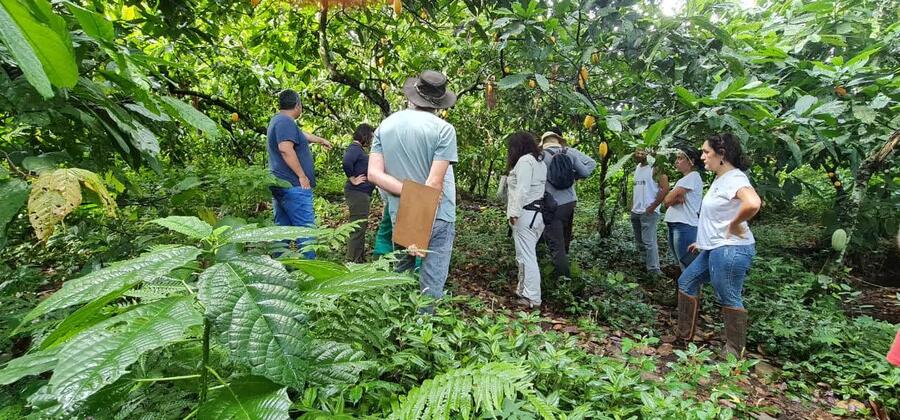
Participants in a program in southern Bahia led by ELTI and IPÊ learn about agroforestry systems, which can promote income streams for landowners while also supporting native biodiversity in tropical forests. Photo: ELTI.
Additionally, several faculty members and students introduced their research in the region. Ashton and Piotto introduced their network of TFS researchers including doctoral students Arun Dayanandan, Manuel Flores, and Thomas Harris as well as Amaya Sathurusinghe ’24 MFS and Yeim We ’24 MFS. Student research involves collaborations with both local communities and large eucalyptus plantation managers to understand tropical forest restoration and agroforestry systems.
After each group had the opportunity to introduce their work, the workshop paused for lunch. Numerous informal introductions and conversations about opportunities for collaboration arose during the break, lending themselves quite naturally to the workshop’s second objective. Splitting into four teams made up of individuals from each of the stakeholder groups – ELTI, TFD, TFS researchers, and Brazilian collaborators – the workshop attendees began to discuss opportunities for future collaborations with a goal of promoting further programming or dialogue.
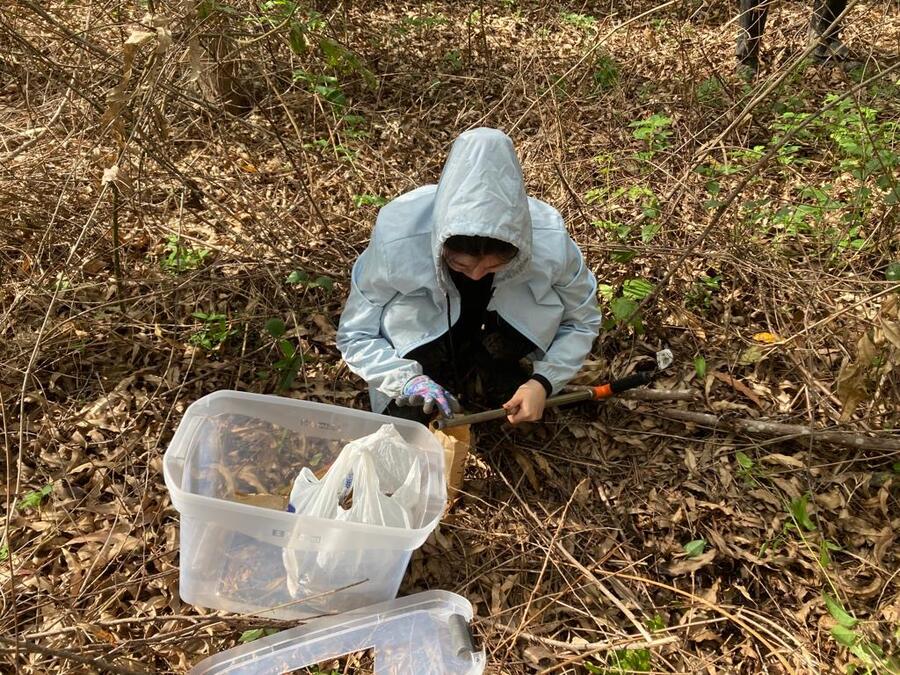
TFS student researcher Yeim We ‘24 MFS collects soil samples for analysis in a eucalyptus plantation in southern Bahia, July 2023. Photo: David Woodbury.
Through the workshop, individuals realized that there are others working on different sides of many of the same questions in the same region. The first step to creating authentic transdisciplinary collaborations is understanding the opportunities that may exist. Garen reflected that that “the puzzle pieces do fit together” and that opportunities for collaboration abound. Garen’s hopes that efforts toward establishing ELTI’s Brazilian training landscape could incorporate the research teams’ work on restoration and agroforestry, as well as TFD’s stakeholder networks in the region. ELTI’s training field sites could be the product of not just a single collaboration between ELTI and a partner like IPÊ, but a network of collaborations between The Forest School and a network of partners in Bahia.
To that end, following the conclusion of the workshop, Garen, Ashton, Piotto, Crepaldi, and Ditt traveled to Yale-Myers Forest in northeastern Connecticut. The field visit aimed to show TFS model of experiential education in action. Over the course of a field day, the group focused not just on the topics taught at the forest, but the ways in which they are taught through an experiential, hands-on lens. Through conversations, the team began to discuss ways in which the model could be adapted for experiential learning and community engagement in southern Bahia.
After this first collaborative effort, Garen is excited about the potential for future collaborations between TFS researchers and CPIs. She hopes to promote cross pollination between different efforts around a specific theme in a region, much like this focus on tropical forest restoration in southern Bahia. Garen notes that there may be future opportunities for collaborative efforts in Indonesia. ELTI and TFD are both active in the nation and are interested in furthering their collaborations, but it will take further investment in capacity building—much like the efforts initiated by this workshop—to fully realize these new networks.




